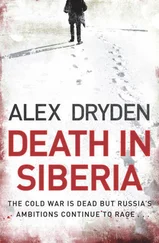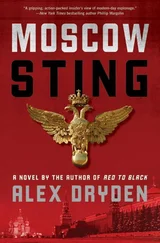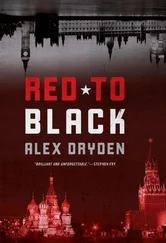She took a seat near the driver in order to be the first out, knowing that behind her was a watcher, and perhaps more than one. The bus’s heater wheezed, and pumped a mixture of engine oil and stifling air into the enclosed space. They wouldn’t make a move yet—her watchers—she knew that now. They would want to know why she was here in Ukraine. The real prize for them was her. The KGB had been obsessed with finding her for more than four years. But first they would want to discover who she was meeting and what she had come to find. She would have to lose them once the bus reached Sevastopol—unless she lost them before her destination. Above all she had to protect the courier, their link with the agent. But that was twelve hours away, over the long slow bus route to and then across the Crimea.
The seats were small and the bus full. She was squeezed on the window side next to a man in a thick padded jacket and workman’s boots. He fell asleep almost immediately. On the seats directly across the aisle were two plump women. She guessed from their rural appearance that they came from a village along the way. They talked purposefully to each other, never pausing. She didn’t look behind at anyone else seated on the bus. For a while she pretended to doze, but she remained alert for any movement in the aisle. Time stood still.
The bus climbed and descended the undulating land, stopping at a few villages and sometimes out in the middle of nowhere, until they reached Nikolayev. There was a stop for fifteen minutes and Anna watched the two women, but while one or two passengers boarded or got off the bus the two women stayed where they were, chatting endlessly. Then they set off again, across the Roskovsky Straits at Kherson. There was another stop there and then another stop and another leg to the bridge onto the Crimea at Krasnoperekopsk. As they entered the Crimea, they were about two-thirds of the way to Sevastopol.
After nearly two hours beyond the city of Krasnoperekopsk, and now well into the Crimea, the bus pulled into a service station at a remote crossroads that served as a stop. They would have the usual fifteen minutes, the driver said. There was a grim-looking café and a couple of pumps. The two women across the aisle from her picked up half a dozen heavy plastic bags and made for the door. It was their stop, she realised.
Anna put on her backpack and got off the bus quickly in order to catch up with the slow-moving women. They were now walking in a waddling motion from side to side with the weight of their bags. They were still talking without pause. A change of plan, Anna decided, a change of mind. That was a sign of intelligence, to be able to change your mind. When she drew level with the women, she smiled at them and offered to carry some of their bags. The women were struggling to keep hold of everything.
“I’ve come to visit my grandmother,” she said.
As she took three of the bags she still didn’t look behind her. She would leave them to guess whether or not she was aware of their presence.
Around the rear of the service station, there was an ancient pickup with peeling dark red paint, where the bare metal itself wasn’t showing through. It had its engine running for warmth. One of the two women indicated that the truck was where they were going. A man was sitting in the driver’s seat, Anna now saw—a brother, a husband, perhaps?
“Where are you going?” Anna asked.
“Voronki,” one of the women replied.
“I’m going to Vihogradovo,” Anna said.
“It’s not on our way, dear,” the second woman replied.
“Perhaps you could give me a ride to the Vihogradovo road?”
The women didn’t know.
The man in the driver’s seat didn’t get out or offer to help. The women opened the passenger door and put their bags in first, then one of them began to climb in ponderously over the high sill of the truck.
“I’m going to the Vihogradovo road,” Anna said to the driver.
He shrugged. “These women take up all the room.” They were squeezed onto a double seat next to the driver.
“I can sit in the truck bed.”
He stared at her.
“I’m here to visit my grandmother. She’s dying.”
“We’re all dying,” the man said.
“Not so quickly, I hope,” she replied.
He didn’t take his eyes from hers. “You want to sit in the rain?” he said as though he couldn’t care less. Then he shrugged again. “It’s up to you,” he said and looked away.
She threw her pack into the back of the truck before he could change his mind and climbed in using the wheel as a step. As the truck pulled away, she looked back for the first time. The second man she had seen in the alley near the boulevard was now talking into a mobile phone. She saw the grey leather cap and the black hair coming out at an angle over the khaki collar. They had lost one man and now they had no backup on the bus but him. Perhaps there was a vehicle following the bus, but for now he was alone. Like her, they would have to improvise. The man didn’t look at her but she knew it was him.
As the truck pulled away from the main road and up into the hills, the thin mist turned to fog.
The road wound its way through villages and across moorland. The journey was slow, the old truck dropping to low gears for the slightest climb. Two vehicles passed them, though she couldn’t identify who was in them. And then after nearly an hour she saw a car, far enough behind them to be tailing the truck. The truck was so slow the car should have overtaken them, but it hung there, emerging then disappearing, as the fog rolled across the hills. An hour later the truck she was in came to a crossroads high up in the Crimean peninsula.
The red truck stopped. She glanced back at the car. It had pulled over, just visible where the fog was closing on the road. She looked around for an escape, but she could only see less than a few hundred yards. The land absorbed the colourlessness of winter, but the rain had eased, leaving a dampness that hung in the air. The truck was going straight ahead across the road. Anna had told the driver she was going along the road to the left, that was the way to Vihogradovo. She climbed down and the woman sitting nearest the window opened it.
“Thank you,” Anna said.
“It’s another twenty-five kilometres,” the driver replied.
“How will you get to Vihogradovo?” one of the women asked.
“I’ll get a ride. If not, I’ll walk.”
The driver wasn’t going to offer her a ride.
“Good luck,” one of the women said and patted her arm through the open window. The truck pulled away and disappeared over a ridge and into the fog.
She stood alone at the crossroads and looked back. She saw the car pulling out onto the road behind her and watched it approaching slowly. The moment of truth. She saw now that there was only one person inside it. She had upset their plans, confused her pursuers. She waited by the road where it turned to the left on the way to Vihogradovo and the car turned, too, and began to approach. The man would have to make a decision, drive on by and risk losing her, or stop. If he didn’t kill her in the opening few seconds, it would be fatal for him. And she knew they wanted her alive. She was to be paraded at the Forest before her interrogation began. That they wanted her alive was now their biggest and most deadly weakness.
She put out her hand in the pretence of hitching a ride and the car hesitated. The man was there to watch her, she knew, not to come into contact with her. But then the car pulled over towards the verge and crawled the few yards to where she stood before it stopped. It was the man with the black hair that came over his collar. He wasn’t wearing the grey cap now, she saw it on the passenger seat. Through the window, she could see indecision in his eyes. He needed help, orders, this was beyond his knowledge. He didn’t want to act alone, or maybe he couldn’t. Her approaching him—that was not in the book—she was supposed to be running from him, leading him to her secret destination. There was no preparation for this. It seemed that it was suddenly too big for him. And then she saw in his eyes the possibility of personal glory, to be the officer who captured Anna Resnikov.
Читать дальше












